Interpretation of Three Wan Li in Chang ‘an: A "Wan Li’s Return" about the Tang Dynasty
Special feature of 1905 film network Since Ne Zha, Guoman has officially declared its rise. Classical mythology, folklore, Four Great Classical Novels … … The theme of Guoman is constantly innovating, and the ultimate goal is always to carry forward traditional culture. A series of domestic cartoons with their own characteristics converge into a big river, which is full of the cultural confidence of the Chinese nation.
On July 8th, Three Wan Li in Chang ‘an was released. As the first part of the new culture, Three Wan Li in Chang ‘an develops the literati story of the Tang Dynasty under the historical context. History, poetry, and verve together constitute the stirring Chang ‘an, Chang ‘an and Wan Li, and each step has a new harvest.
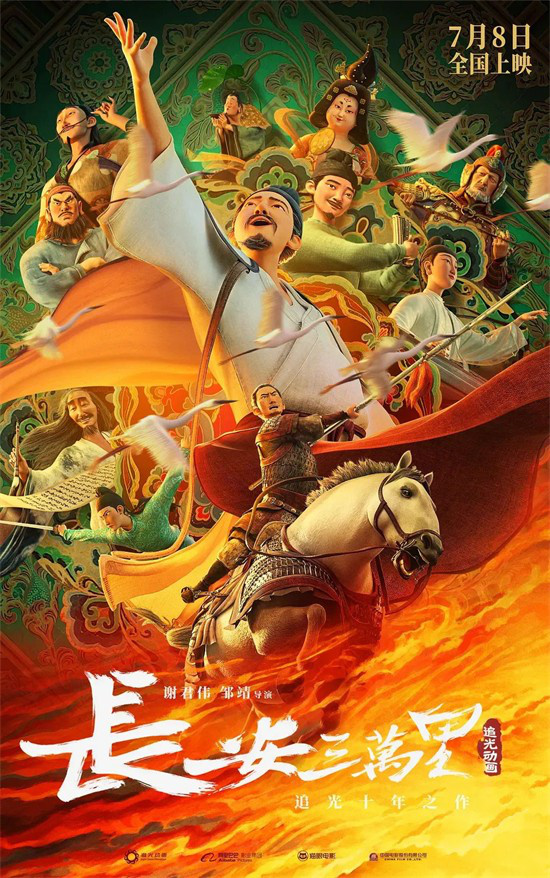
In this way, one Wan Li, another Wan Li,Let Xiaobian take everyone with him.The end of this trip is "Wan Li’s Return" in the prosperous Tang Dynasty!
Chang ‘an-Wan Li: History
Sheng Tang Zeng Yi Xian Yi, old and young
● Historical facts
"Three Wan Li in Chang ‘an" has chosen a historical theme with almost zero threshold, and both men, women and children will feel cordial and familiar in the process of watching the movie. The film involves familiar historical facts such as An Shi Rebellion, the Tubo War, Yang Yi Yi Er and so on. As long as we mobilize the knowledge of middle school, we can easily open the door to Chang ‘an Three Wan Li.
In the Anshi Rebellion, poets such as Li Bai, Du Fu, Gao Shi and Wang Changling all had stormy life experiences, and the film also unfolded stories around specific people, telling big history with small incisions.
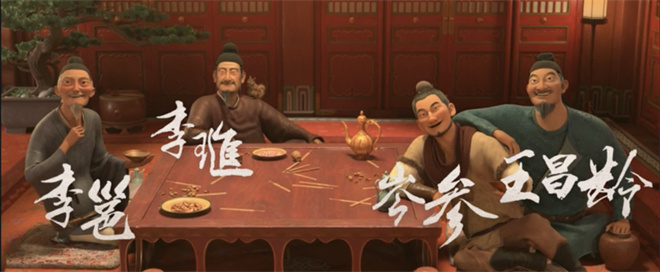
● City
As the name implies, Chang ‘an Three Wan Li describes Chang ‘an in a huge space. Chang ‘an was the capital of the Tang Dynasty and the largest city in the world at that time, with residents from all over the world. Chang ‘an is a dream city for literati to make a name for themselves. When Li Bai was called into the court to be an academician, his popularity rose in Chang ‘an, and he met He Zhizhang who appreciated himself. This doyen was more than forty years older than Li Bai.
Meng Haoran went to Chang ‘an to take the imperial examination at the age of 40. When he attended the poetry association in the secretary province, he won the championship with a phrase "weiyun is a light river, and the raindrops are sparse", which made him famous in Chang ‘an during World War I. ……
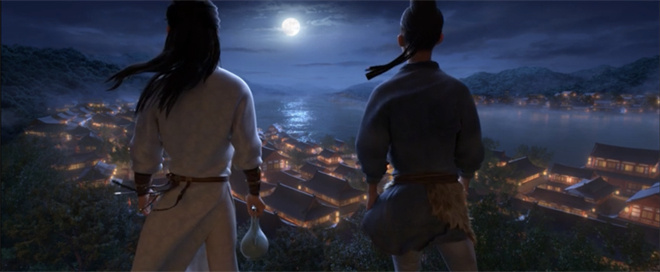
Chang ‘an and Yangzhou were the most prosperous and wealthy cities in the world at that time. The film’s depiction of the economic prosperity, cultural contention and beautiful scenery of these cities instantly dragged the audience into the prosperous Tang Dynasty. For this reason, when we see the Anshi Rebellion and the historical node of the Tang Dynasty from prosperity to decline, we will be even more lamentable and regretful.
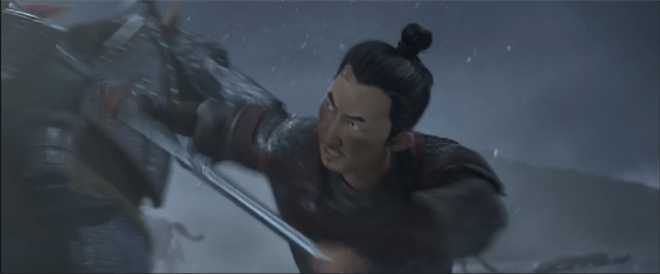
Chang ‘an II Wan Li: Poetry
See the world, see all beings and see yourself.
● Poetic style
The film begins with the tune: "In my Tang Dynasty, everyone wrote poems, from the king to the peddler."Tang poetry is not only the flow of national quintessence, but also helps us to see the world and all beings. Li Bai and Du Fu are two different styles of Tang poetry.peak.
● See the world.
Li Bai’s poem "Seeing Heaven and Earth" often focuses on the vast universe, human spirit and high morale, and is deeply loved by young people.

The film expresses the artistic conception of "Coming into Wine" by surreal means. The project "Three Wan Li in Chang ‘an" lasted for three years, and the production of the segment "Coming into Wine" took two years. Li Taibai, Cen Fuzi and Dan Qiusheng, these names who live in legends and poems, traveled by crane together, saw the splendid scenery of Chang ‘an and shared their lofty sentiments.
● See all beings.
Du Fu’s poem "Seeing all beings" cares about all kinds of social conditions, especially those little people who are not well known. Xin ‘an Official, Shihao Official, Tongguan Official, Newly Married, Homeless, Farewell to the Old … … Du Fu used three officials and three farewells to tell the bitterness and tears of too many toiling people.

Although many people may prefer Li Bai’s elegance and elegance and Li Shangyin’s sadness when they are young, Du Fu’s sincere words can resonate with us more after middle age.
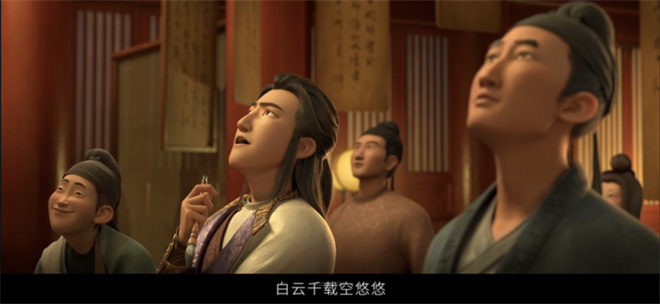
"Three Wan Li in Chang ‘an" gives us an opportunity to recognize Tang poetry with a brand-new vision. We constantly "see the world" and "see all beings" from the poem, and finally "see ourselves".
Chang ‘an Three Wan Li: God
See the world, see all beings and see yourself.
● Charm
The reason why Datang is famous for Changhong lies in the word "verve".
Every poet is using his works, experiences and personality charm to provide us with spiritual sustenance.
● Li Du
Confucian culture pays attention to the golden mean, but Li Bai has been "bohemian and loves freedom" all his life, and he has lived his true self in social discipline.
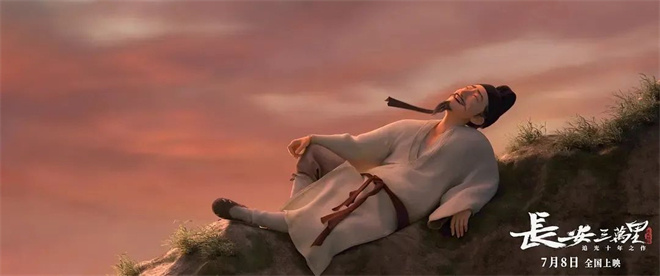
And Du Fu is the acme of Confucianism. Even if he is in difficulties and hardships, he has been "cold as iron for many years, and his charming son is lying down and cracking." There is no dry place at the head of the bed, and the foot of the rain is like hemp. "He still has the world’s poor people in his heart. Such an ambition of worrying about the country and the people is also a profound example for modern people.
● True.
The depiction of poets in Three Wan Li in Chang ‘an tends to be secularized and real. These are people who have really existed in history. Their characters should not be based on stereotypes, but should be based on poetry and historical facts.
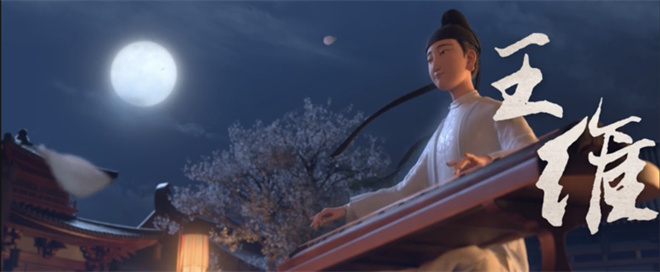
Li Bai, who has a big belly, has a three-dimensional and full personality, honest and frank’s rigid Gao Shi has also been pleased with his clothes, and Wang Wei, who is full of Zen, also likes to make friends with talented people who drink heavily. Only true personality can convey the charm of one thousandth of the Tang Dynasty.
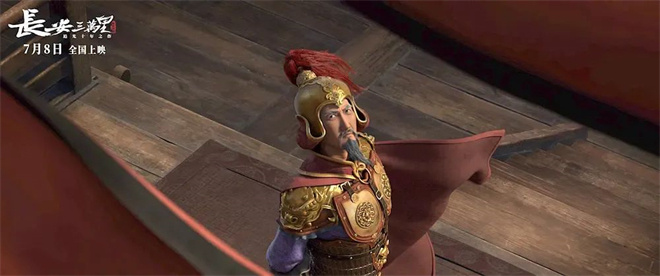
Three Wan Li in Chang ‘an is a strong feeling of home and country. Every poet’s personality is different and his fate is ill-fated, but behind it is a deep responsibility for the country and the world and the people. The friendship between these talented people has also become more splendid because of poetry, and it has become more estrus than Jin Jian because of the turmoil of the times.
History, poetry and verve contain each audience’s own philosophy of life. Behind the high-spirited spirit of the literati is the support of strong national strength. After the Millennium, it coincides with another prosperous time.